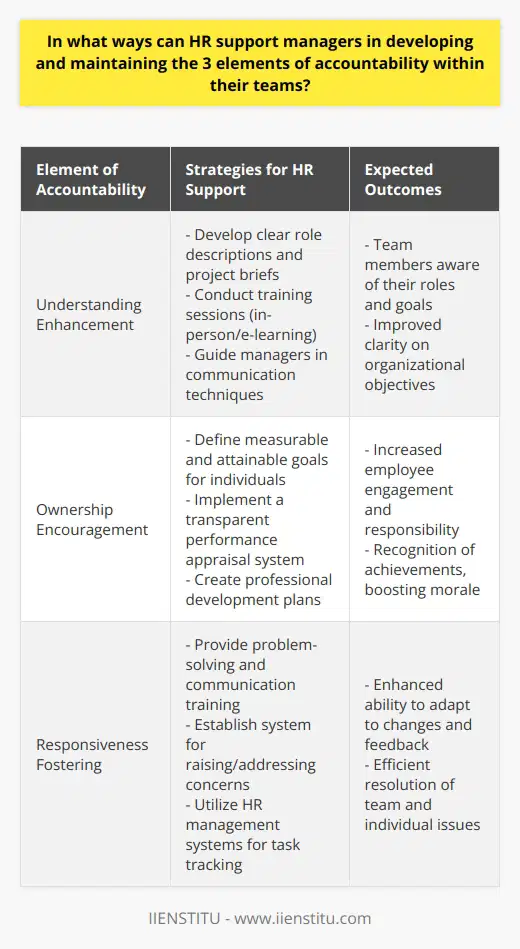
I still remember the day when I first stepped into a managerial role. The excitement was palpable, but so was the weight of responsibility. I was eager to lead my team to success, yet I soon realized that leadership isn't just about setting goals; it's about holding ourselves and others accountable to achieve those goals. Accountability became not just a buzzword but a guiding principle in my journey as a leader.
Introduction
What Accountability Means
Benefits of an Accountability Culture
Role of HR Management
Conclusion
Understanding Accountability in Leadership
At its core, accountability in leadership means taking ownership of one's actions and decisions. It's about leaders setting the tone for their teams by being responsible and transparent. When I think back to that initial period as a manager, I recall a project that didn't go as planned. Instead of pointing fingers, I gathered the team, and we collectively analyzed what went wrong. This approach not only resolved the immediate issue but also fostered trust and respect among team members.
The Essence of Accountability
Accountability isn't just about admitting mistakes; it's about:
1- Setting Clear Expectations: Without clear goals, accountability becomes a moving target.
2- Providing Constructive Feedback: Regular feedback ensures that everyone is aligned.
3- Encouraging Ownership: Empowering employees to take charge of their tasks.
By embracing these elements, leaders can cultivate an environment where accountability thrives.
The Benefits of an Accountability Culture
Creating an accountability culture at work has far-reaching benefits. Not only does it enhance performance, but it also builds a strong organizational foundation.
Boosting Performance and Morale
When employees know they are accountable:
Productivity Increases: There's a direct correlation between accountability and output.
Trust is Built: Teams communicate openly, knowing that everyone is playing their part.
Employee Engagement Rises: Accountability fosters a sense of purpose and belonging.
I've witnessed firsthand how a lack of accountability can lead to missed deadlines and frustrated teams. Conversely, when my team embraced accountability, our projects were completed on time, and the quality of work improved significantly.
Reducing Turnover
An accountability culture can also reduce employee turnover. When employees feel responsible for their contributions and see their impact, they're more likely to stay committed to the organization. High turnover rates often stem from disengagement, which accountability can mitigate.
The Role of HR Management in Fostering Accountability
Human Resources (HR) plays a pivotal role in embedding accountability within an organization. As someone who pursued an online human resources management certificate program, I gained valuable insights into how HR strategies can shape company culture.
Leadership without accountability is like a ship without a rudder - it will never reach its destination.
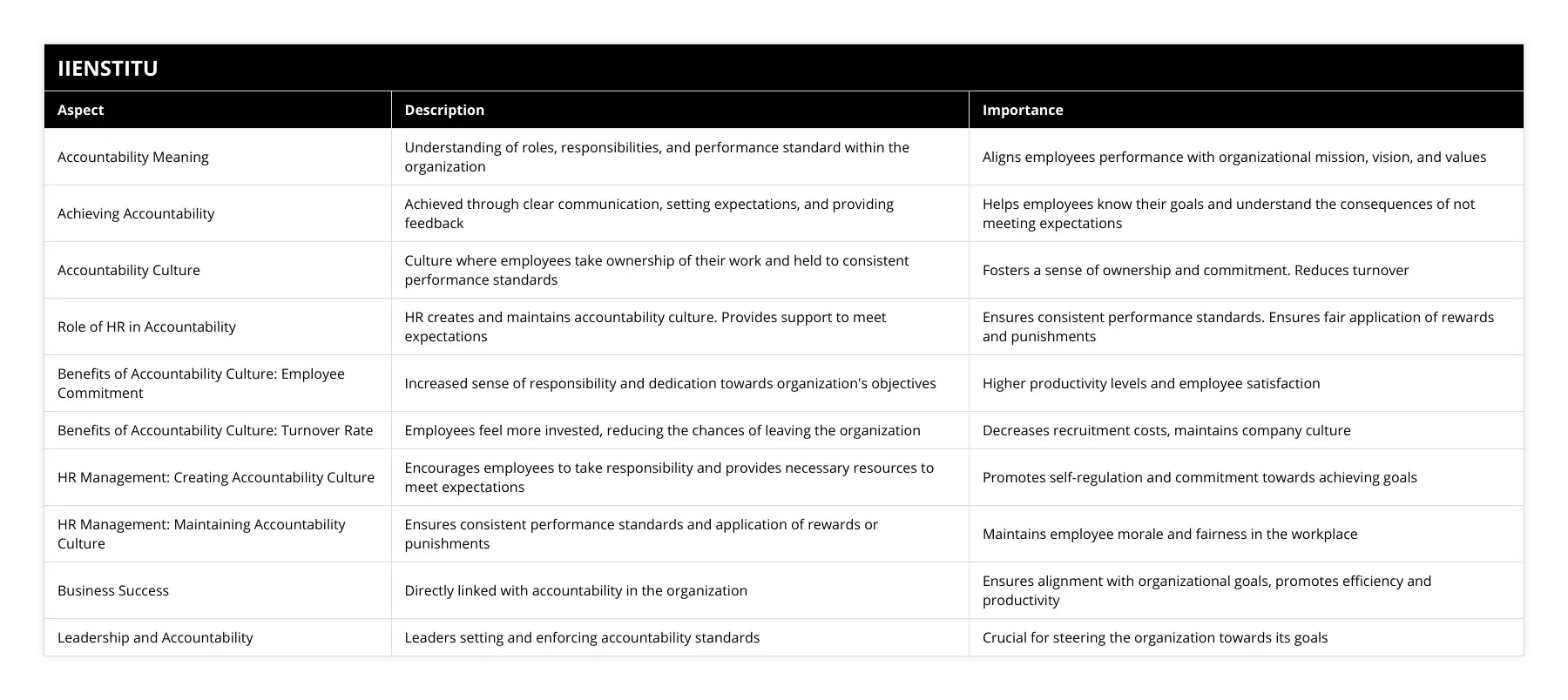
Developing Clear Policies and Procedures
HR is responsible for:
Establishing Performance Standards: Clear benchmarks help employees understand expectations.
Implementing Training Programs: Ongoing education reinforces accountability principles.
Ensuring Fairness and Consistency: Policies are applied uniformly to all employees.
Supporting Leadership and Employees
HR acts as a bridge between leadership and staff by:
1- Facilitating Open Communication: Encouraging feedback loops and dialogue.
2- Providing Resources: Tools and support systems that aid in meeting objectives.
3- Addressing Issues Promptly: Tackling problems before they escalate.
During my studies, I learned that HR's involvement is critical in sustaining an accountability culture. By aligning HR practices with organizational goals, companies can enhance performance and employee satisfaction.
Personal Experiences with Accountability
One of the most profound lessons I've learned is that accountability starts with oneself. There was a time when a project's failure could have been blamed on external factors. Instead, I chose to introspect and identify areas where I could improve. This self-reflection not only made me a better leader but also inspired my team to do the same.
Real-Life Example: Turning Failure into Growth
A few years ago, my team missed a significant deadline. Initially, frustration was high, but we used this setback as an opportunity to:
Analyze Our Processes: Identifying bottlenecks and inefficiencies.
Communicate Openly: Holding a no-blame meeting to discuss issues.
Implement Changes: Adjusting workloads and timelines accordingly.
The result? Our next project was a resounding success, completed ahead of schedule with accolades from upper management.
Steps to Build an Accountability Culture
Building such a culture doesn't happen overnight. Here are steps that have proven effective:
1- Lead by Example: Demonstrate accountability in your actions.
2- Set Clear Goals: Ensure everyone knows what's expected.
3- Provide Support: Equip your team with the resources they need.
4- Recognize and Reward: Acknowledge those who exemplify accountability.
5- Address Issues Promptly: Tackle problems head-on to prevent escalation.
Underlining the importance of these steps helps reinforce their significance in establishing a robust accountability framework.
The Ripple Effect of Accountability
Accountability doesn't just benefit individual teams; it positively impacts the entire organization. Companies known for their accountability culture often enjoy:
Enhanced Reputation: Trusted by clients and stakeholders.
Financial Growth: Improved efficiency leads to better financial performance.
Innovation: A safe environment to take calculated risks encourages creativity.
I recall a colleague who implemented an accountability initiative in their department. The changes led to a 15% increase in productivity and a significant boost in employee morale. Stories like this highlight the transformative power of accountability.
Conclusion
Accountability is more than a managerial mandate; it's a cornerstone of effective leadership and organizational success. Without it, as the saying goes, "Leadership without accountability is like a ship without a rudder - it will never reach its destination." Embracing accountability leads to:
Stronger Teams
Improved Performance
Reduced Turnover
For leaders, owners, and managers, fostering an accountability culture isn't just beneficial—it's essential. And with the support of HR management, whose role is crucial in this journey, organizations can create an environment where accountability is ingrained in every action and decision.
References
Collins, J. (2001). Good to Great: Why Some Companies Make the Leap... and Others Don't. HarperBusiness.
Schein, E. H. (2010). Organizational Culture and Leadership (4th ed.). Jossey-Bass.
Kouzes, J. M., & Posner, B. Z. (2017). The Leadership Challenge: How to Make Extraordinary Things Happen in Organizations (6th ed.). Wiley.
Drucker, P. F. (2008). Management. HarperCollins Publishers.
Lencioni, P. (2002). The Five Dysfunctions of a Team: A Leadership Fable. Jossey-Bass.
Related Course: If you're interested in deepening your understanding of HR's role in fostering accountability, consider enrolling in an online human resources management certificate program. It's a great way to enhance your skills and contribute effectively to your organization's success.
Frequently Asked Questions
What role does HR Management play in creating an accountable culture?
Organizational culture has been recognized as a significant factor in the success of organizations. As such, organizations must create an environment that promotes accountability among employees. Human Resource Management (HRM) plays a crucial role in creating such an environment.
HRM is responsible for setting the tone for how employees engage with each other, their supervisors, and the organization. This includes setting expectations for accountability. HRM can do this by providing guidance and training on appropriate behaviors, developing and reinforcing organizational policies, and creating a transparent accountability system.
HRM also plays a vital role in creating an environment of trust. Trust between leaders and employees is essential for employees to feel comfortable taking risks and being accountable for their actions. HRM can build this trust through open communication, providing opportunities for employees to voice their opinions, and providing support to employees when needed.
Furthermore, HRM is responsible for ensuring that employees have the tools and resources they need to be successful. This includes providing training and development opportunities, offering competitive compensation and benefits packages, and ensuring that employees have the appropriate resources to complete their tasks.
Finally, HRM creates a culture of accountability by providing recognition and rewards for employees who demonstrate exemplary behavior. This can include bonuses, promotions, awards, and public recognition. Rewards and recognition are essential for creating an environment where employees feel valued and motivated to achieve goals.
In summary, HRM plays a critical role in creating an accountable culture. By setting expectations, fostering trust, providing resources, and offering rewards and recognition, HRM can create an environment that encourages employees to take ownership of their actions and be held accountable for their performance.

How can HR Management ensure that employees are held accountable for their actions?
Employee accountability has increasingly become a significant concern for Human Resources (HR) managers. This is because organizational success depends, in large part, on the performance and behavior of individual employees. As such, HR managers need to ensure that employees are held accountable for their actions.
One way to ensure employee accountability is to have clear and consistent workplace policies. These policies should be communicated to employees and enforced regularly. This will ensure that employees understand what is expected of them and the consequences for not adhering to the guidelines. Furthermore, HR managers should ensure that employees are regularly informed of changes to workplace policies and are allowed to provide feedback.
In addition to having clear policies, it is also crucial for HR managers to have an effective system for addressing employee misconduct. This should include a process for evaluating employee behavior and determining appropriate disciplinary action. Furthermore, corrective action should be applied consistently to all employees regardless of their seniority or position.
Finally, HR managers should foster a culture of accountability. This involves encouraging employees to take responsibility for their actions and holding them to a high-performance standard. This can be accomplished by providing employees with feedback on their performance and rewarding them for their efforts. Additionally, HR managers should ensure that employees receive the necessary resources and support to help them meet their goals.
In conclusion, HR managers are vital in ensuring that employees are held accountable for their actions. This can be achieved through having clear and consistent workplace policies, having an effective system for addressing employee misconduct, and fostering a culture of accountability. By implementing these strategies, HR managers can ensure that employees are held to a high standard of performance and are motivated to contribute to the organization's success.
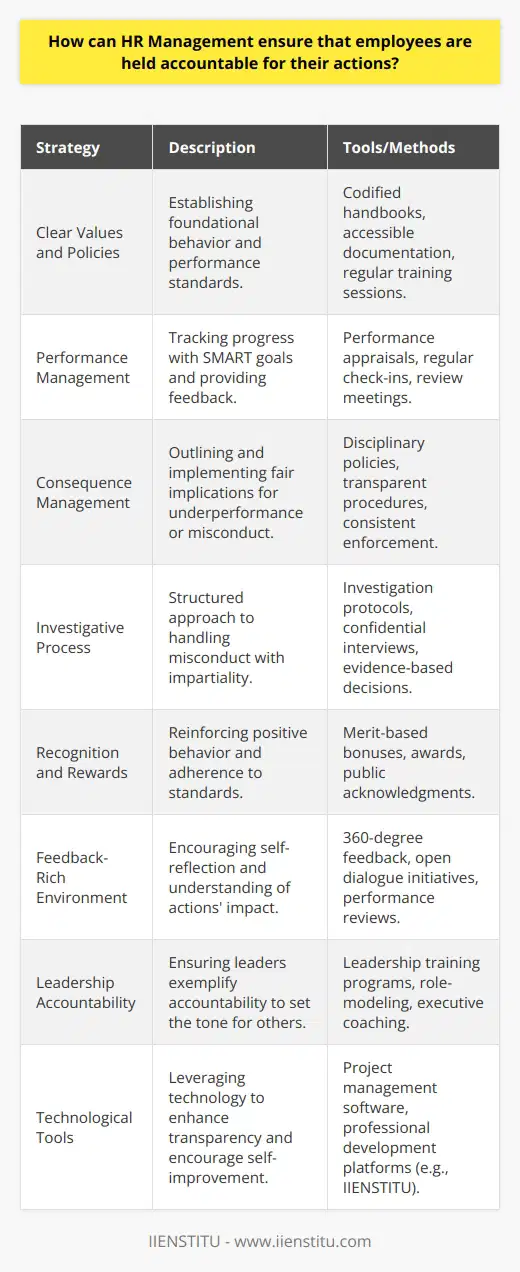
What strategies can HR Management use to set a positive tone of voice when leading with accountability?
When leading with accountability, Human Resource Management (HRM) should use effective strategies to create a positive tone of voice. Such a strategy is essential in building a culture of trust and collaboration between employees and setting clear expectations and standards. This article will discuss some strategies HRM can use to set a positive tone of voice when leading with accountability.
Firstly, HRM should communicate with employees respectfully and professionally. This includes using appropriate language and avoiding any form of criticism or judgment. HRM should also be attentive to the emotional needs of employees, taking the time to listen to their concerns and respect their opinions. Additionally, HRM should be open to feedback and treat all employees equally in decision-making.
Secondly, HRM should provide employees with clear guidance and expectations. This includes communicating expectations clearly and consistently, setting achievable goals, and providing resources or support for employees to reach their goals. Additionally, HRM should recognize employees' efforts who meet expectations and provide positive reinforcement when appropriate.
Thirdly, HRM should establish a culture of open dialogue and collaboration. This means creating an environment where employees feel comfortable voicing their opinions and being involved in decision-making. HRM should also provide guidance and support to ensure all employees know the expectations and standards.
Finally, HRM should create an atmosphere of trust and respect. This includes creating a safe and secure environment for employees to voice their concerns or ideas without fear of repercussions. Additionally, HRM should be open and honest with employees about the company's goals, successes, and failures.
In conclusion, HRM should use effective strategies to set a positive tone of voice when leading with accountability. These strategies include communicating with employees respectfully and professionally, providing clear guidance and expectations, establishing a culture of open dialogue and collaboration, and creating an atmosphere of trust and respect. By following these strategies, HRM can develop a culture of trust and cooperation and ensure employees are held accountable to the highest standards.
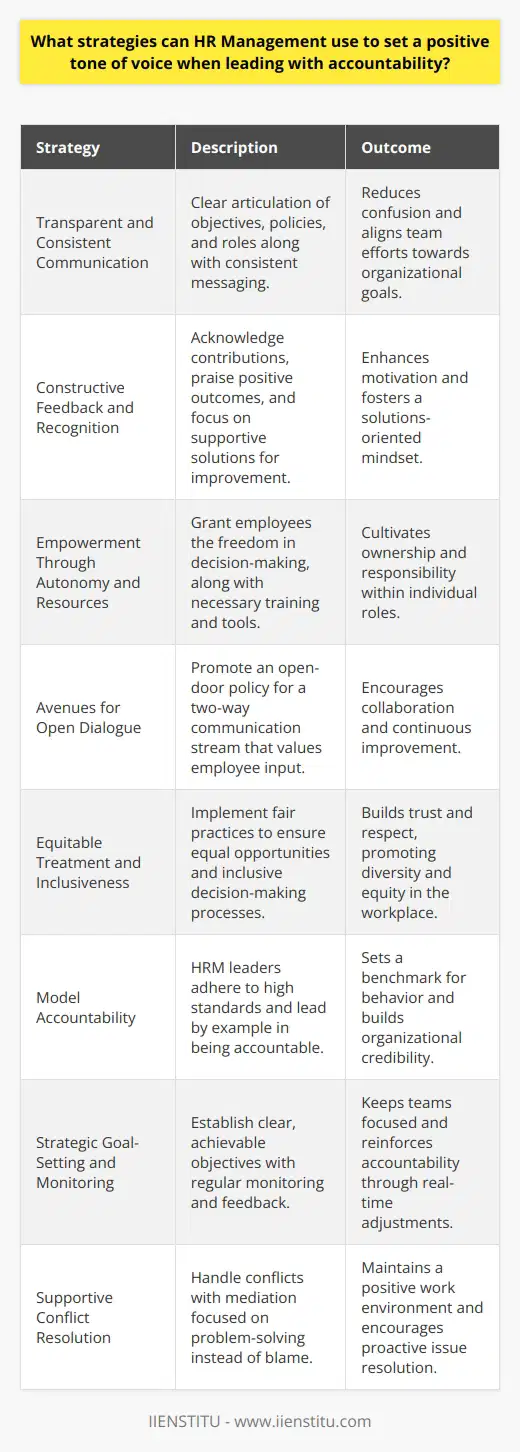
How does HR promote accountability within an organization?
Establishing Accountability Frameworks
Human resources (HR) departments play a critical role in promoting accountability within an organization. They establish clear accountability frameworks that define roles, responsibilities, and expectations for each employee. By setting performance standards and communicating these expectations, HR ensures that employees understand their obligations and the consequences of not meeting them.
Monitoring Performance and Providing Feedback
Regular assessments of employee performance allow HR to identify areas for improvement and provide targeted feedback, which is essential for maintaining accountability within the organization. Performance evaluations conducted by HR reveal employees' strengths and weaknesses, allowing the department to guide them towards improvement while celebrating their achievements. Moreover, these assessments provide an opportunity for employees to raise concerns or discuss their own perspectives on the job.
Strengthening Ethical Conduct
HR also instills a culture of integrity and ethical conduct within the organization. By developing and enforcing a code of ethics, HR emphasizes the importance of adhering to values and principles that govern the behavior of employees in the workplace. This code of ethics acts as a moral compass for staff members, helping them make responsible decisions and hold themselves accountable for their actions.
Providing Training and Development Opportunities
Through the provision of training and development programs, HR equips employees with the necessary skills and knowledge to fulfill their responsibilities effectively. These programs enhance employees' individual competence and build their confidence in aligning their performance with organizational objectives. Providing continuous learning opportunities not only improves employee performance but also demonstrates the organization's commitment to personal and professional growth.
Fostering a Culture of Transparency and Open Communication
HR promotes transparency and open communication in the workplace by establishing channels for employees to share their opinions, ideas, complaints, and suggestions. An open-door policy encourages employees to be candid and forthcoming, fostering a culture of trust and openness. This approach feeds into a sense of ownership and responsibility, making employees feel more accountable for their contributions and performance.
In conclusion, HR plays a vital role in promoting accountability within an organization by developing accountability frameworks, monitoring employee performance, instilling ethical conduct, providing training and development opportunities, and fostering a culture of transparency and open communication. It is through these actions that HR contributes to the overall success of the organization, enhancing employee engagement, and ensuring that all staff members act responsibly and ethically in their work activities.
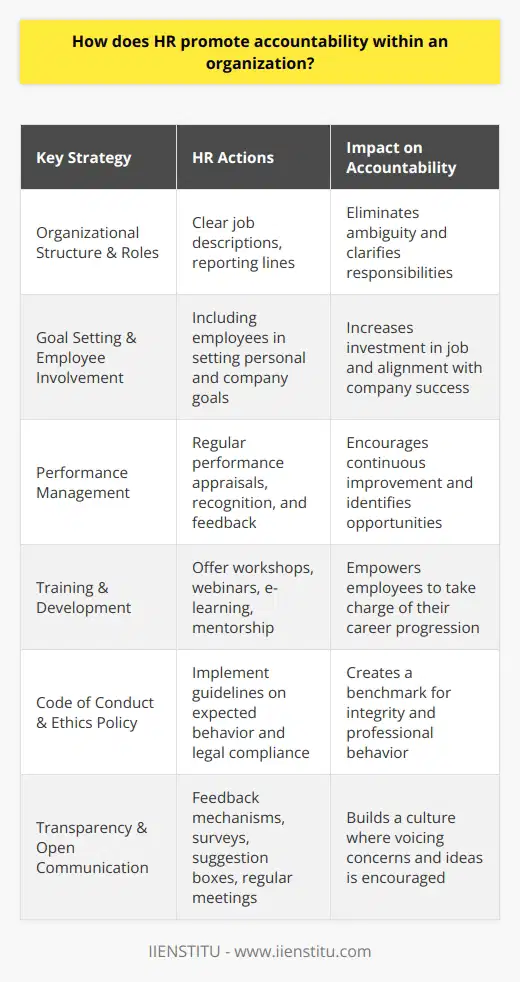
What are the three essential elements of accountability in management and their significance?
Essential Elements of Accountability in Management
**Transparency**
The first essential element of accountability in management is transparency. Transparency is crucial as it allows stakeholders, including employees, investors, and regulatory authorities, to gain better insight into the decision-making process and overall performance of the organization. Managers who prioritize transparency communicate openly and honestly about the company's goals, operations, and outcomes, fostering trust and promoting a culture of openness within the organization. In turn, this helps to ensure that all stakeholders can participate in the decision-making process, identify potential risks, and hold managers responsible for their actions.
**Responsibility**
Responsibility is the second vital aspect of accountability in management. Managers should demonstrate a clear understanding of their roles and responsibilities within the organization and be willing to accept that their decisions and actions have consequences. By cultivating a sense of responsibility, managers become more diligent in their decision-making, leading to better outcomes and a lower likelihood of mistakes. Furthermore, as managers hold themselves accountable for their actions, they model this behavior for their employees, creating an organizational culture that values accountability and is committed to continuous improvement.
**Evaluative Mechanisms**
Lastly, robust evaluative mechanisms represent the third essential element of accountability in management. These mechanisms, such as performance management systems, audits, and employee feedback channels, provide a systematic approach for assessing and monitoring the performance and actions of managers. Evaluative mechanisms are essential for identifying areas of weakness, ensuring that managers adhere to organizational policies, and driving the organization towards its strategic objectives. Regular evaluation and feedback loops not only help hold managers accountable for their performance but also create opportunities for learning and improvement, further promoting a culture of accountability and excellence within the organization.
In conclusion, transparency, responsibility, and evaluative mechanisms form the backbone of accountability in management. Their significance lies in fostering trust, promoting a culture of openness, modeling responsible behavior, and ultimately allowing the organization to achieve its objectives through continuous improvement. By prioritizing these elements, managers can create a high-performance environment that values accountability and meets the expectations of all stakeholders involved.
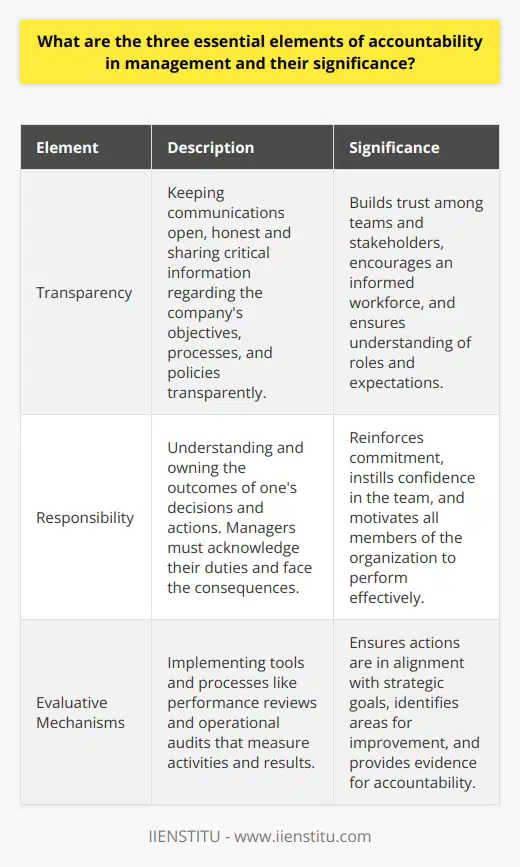
Can you provide a concrete example of how accountability is demonstrated and upheld in human resources practices?
Example of Accountability in HR Practices
Recruitment and Selection Process
A concrete example of accountability in human resources practices can be observed in the recruitment and selection process. In this process, HR professionals are responsible for ensuring that the organization hires the best candidates who are capable of contributing effectively to the company's objectives. They demonstrate accountability by carefully reviewing resumes, conducting interviews, and following all legal and ethical guidelines related to the job hiring process.
Performance Appraisal System
Another area where accountability is crucial is the performance appraisal system. The HR department is responsible for implementing a system that fairly evaluates employees' performance and provides them with the necessary feedback for their professional development. This involves setting up specific, measurable, and achievable performance goals and being transparent about the criteria used to assess employees. Upholding accountability in this context is essential to foster a culture of continuous learning and growth.
Training and Development
In addition to recruitment and performance appraisal, human resources professionals must show accountability in administering training and development initiatives. This responsibility involves identifying skills gaps within the organization and offering relevant training programs to address these identified areas of need. Through strategic planning and execution, HR professionals ensure that training initiatives align with both the employees' career goals and the organization's objectives.
Employee Relations and Conflict Resolution
HR professionals also demonstrate accountability in their management of employee relations and conflict resolution. They address workplace disputes and grievances fairly and impartially, applying consistent policies and procedures to all situations. This approach ensures a level playing field for all employees and discourages favoritism or discrimination, fostering an inclusive and harmonious work environment.
Compliance with Employment Laws and Regulations
Finally, human resources professionals uphold accountability by ensuring the organization remains compliant with all applicable employment laws and regulations. They keep abreast of any changes in legislation and ensure that the company's policies and procedures are updated accordingly. By doing so, they protect the organization from potential legal issues and ensure that all employees enjoy a fair and compliant work environment.
In conclusion, accountability in human resources practices is demonstrated and upheld through various activities, such as the recruitment and selection process, performance appraisal system, training and development, employee relations and conflict resolution, and compliance with employment laws and regulations. Human resources professionals play a critical role in maintaining the integrity and success of an organization by adhering to these principles.
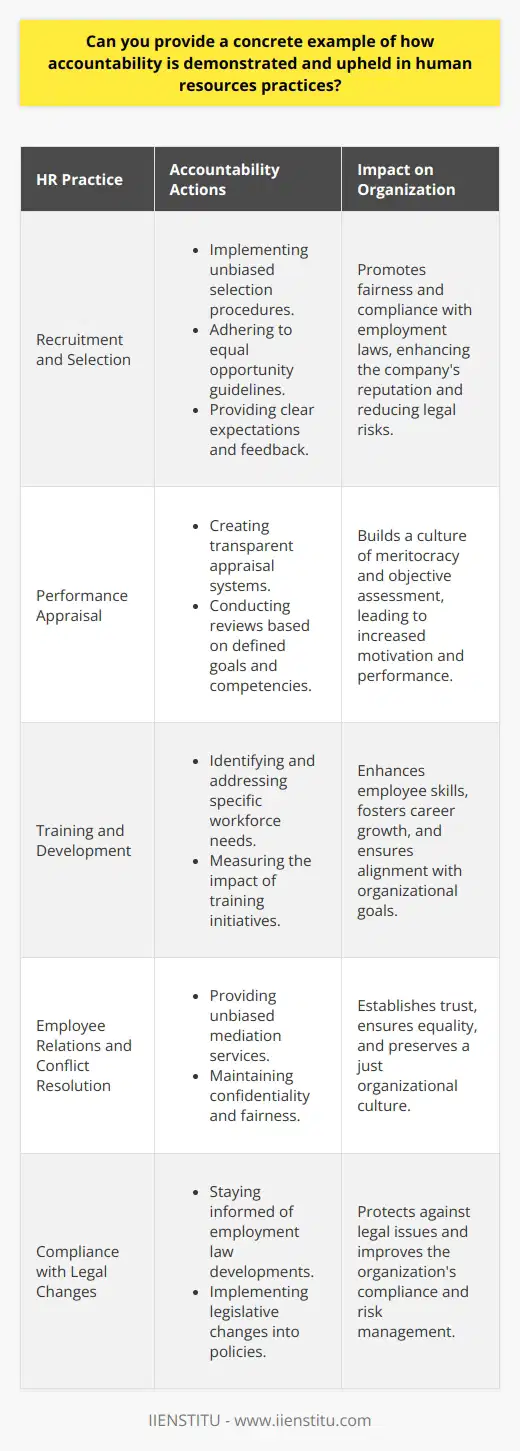
What is the role of HR in fostering accountability in decision-making processes?
Role of HR in Ensuring Accountability
The crucial role of Human Resources (HR) in fostering accountability in decision-making processes is often overlooked. HR serves as the management's eyes and ears, setting the tone for individual and collective accountability in the organization.
Maintaining Ethical Standards
Maintaining high ethical standards is one key responsibility of HR. HR educates employees about the consequences of unethical behavior and the importance of ethical decision making. This education process fosters an environment of accountability, reducing the likelihood of misconduct.
Building Policy Framework
Another critical role of HR is developing and enforcing policies that promote accountability. They create a policy framework within which decision-making processes occur. Clear policies help employees understand the organization's expectations, leading to more informed and responsible decision-making.
Addressing Transparency and Communication
Accountability also links directly to transparency and communication. HR ensures clear communication of expectations and responsibilities to staff members. They ensure that objectives, roles, and performance metrics are clearly communicated, making it easier for employees to be accountable.
Conducting Performance Evaluations
Performance evaluations play a significant role in enforcing accountability. By conducting regular evaluations, HR can highlight any accountability issues. These evaluations also demonstrate to employees that the organization values responsible behavior.
Promoting Accountability Culture
Lastly, HR plays a vital role in creating and maintaining a culture of accountability. Through training, support, and reinforcement, HR ensures that accountability is not only expected but also valued.
In conclusion, HR plays an integral role in fostering a culture of accountability within an organization. They lay the ethical groundwork, establish clear policies, promote communication, conduct evaluations, and maintain an accountability culture. This multi-pronged approach ensures that accountability is deeply ingrained in every decision-making process.
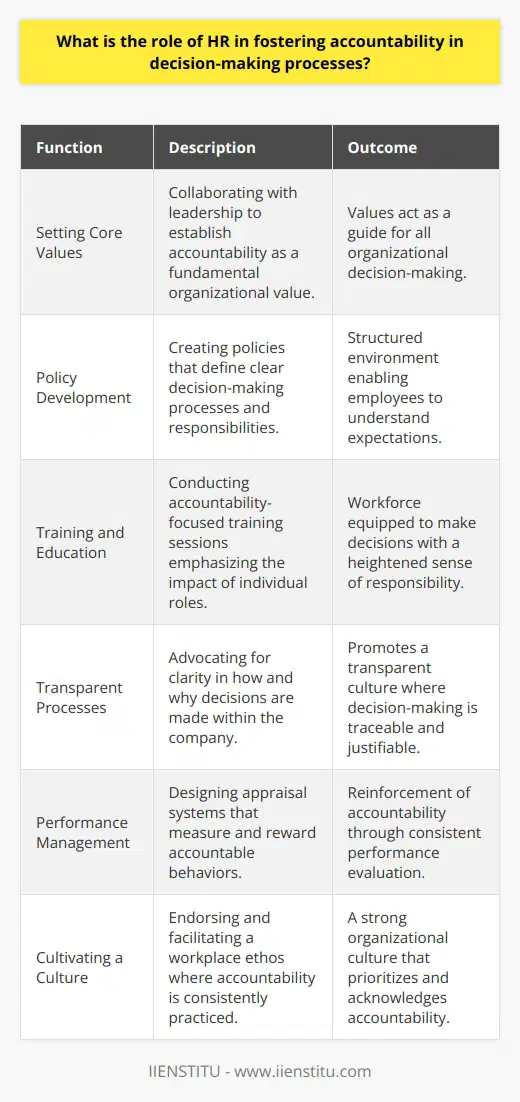
How can HR effectively implement the 4 A's of accountability within an organizational context?
Understanding of Accountability Concept
For the HR department to implement the 4 A's of accountability - Assignment, Authority, Accountability, and Assessment - they must first understand their essence. Accountability refers to the responsibility of an individual or department to perform specific functions with competence.
Implementing Assignment
The first step, Assignment, involves clear role designation within the organization. HR should explicitly allocate tasks to workers, ensuring they comprehend their responsibilities. By setting clear job descriptions, HR makes certain that everyone knows what management expects from them.
Establishing Authority
Concerning Authority, HR should provide employees with suitable authority levels, equipping them to execute their duties efficiently. This involves offering necessary resources and power for individuals to perform tasks effectively.
Enforcing Accountability
Next, HR enshrines Accountability, ensuring that every staff member is answerable for their actions. They can achieve this by instituting a system allowing for easy tracking of responsibilities, duties and outcomes. It also means dealing firmly yet fairly with instances of underperformance.
Facilitating Assessment
The final step, Assessment, allows HR to evaluate job performance. Through regular and fair evaluations, the HR team can ascertain if employees meet their responsibilities. Continuous feedback enables employees to improve, fostering a culture of learning and growth.
In conclusion, HR can effectively implement the four A's of accountability by providing clear definitions of roles, granting corresponding authority levels, ensuring accountability and running regular assessments. These steps can enhance duty performance, boost morale, and ultimately increase productivity within the organization.
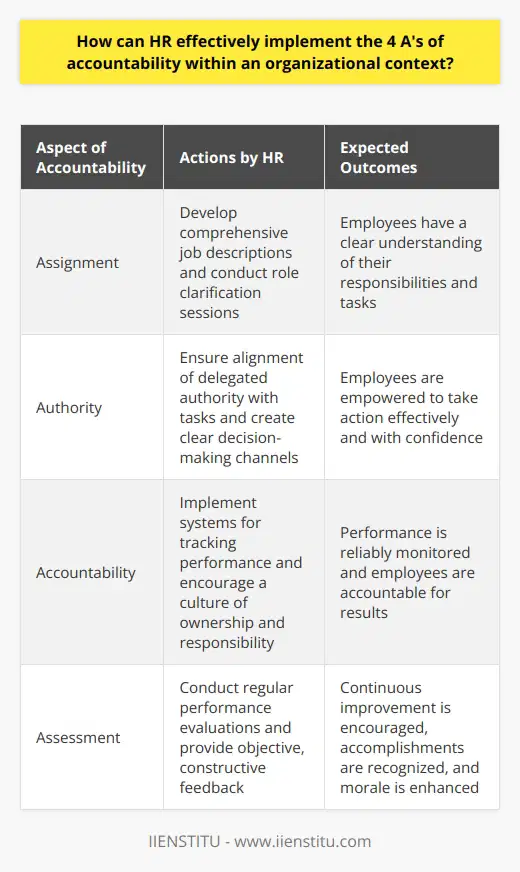
In what ways do the 5 levels of accountability influence the development and execution of HR initiatives?
Strategic Alignment
The topmost level, strategic alignment, directly influences the formulation of human resources (HR) initiatives. HR initiatives should align with the organization's strategy to promote positive outcomes. Missing this alignment may lead to ineffective HR practices and policies, hindering overall performance.
Task Execution
Second, the level of task execution impacts how HR professionals implement initiatives. Effective task management ensures the smooth running of operations and helps in reaching strategic HR goals. Poor task execution may result in disruptions and delays, undermining the effectiveness of HR initiatives.
Individual Performance
At the third level of accountability, individual performance greatly influences the success of HR initiatives. HR professionals must demonstrate a high level of competence and dedication. Their performance can either facilitate or impede the implementation of HR initiatives.
Team Performance
The fourth level, team performance, plays a vital role in executing HR initiatives. High-performing teams often foster a supportive environment encouraging effective collaboration. This synergy aids in smooth implementation, while dysfunction within teams may hinder the progress of HR initiatives.
Organizational Contribution
The fifth level, organizational contribution, refers to the ability to contribute to the organization's goals and success. Here, HR initiatives must prove useful and beneficial to the organization. Negative impact on the organization's overall performance can deem HR initiatives ineffective.
In conclusion, the five levels of accountability significantly shape the development and execution of HR initiatives. HR professionals must address these levels in their strategy to ensure effective implementation and deliver on the organization's objectives.
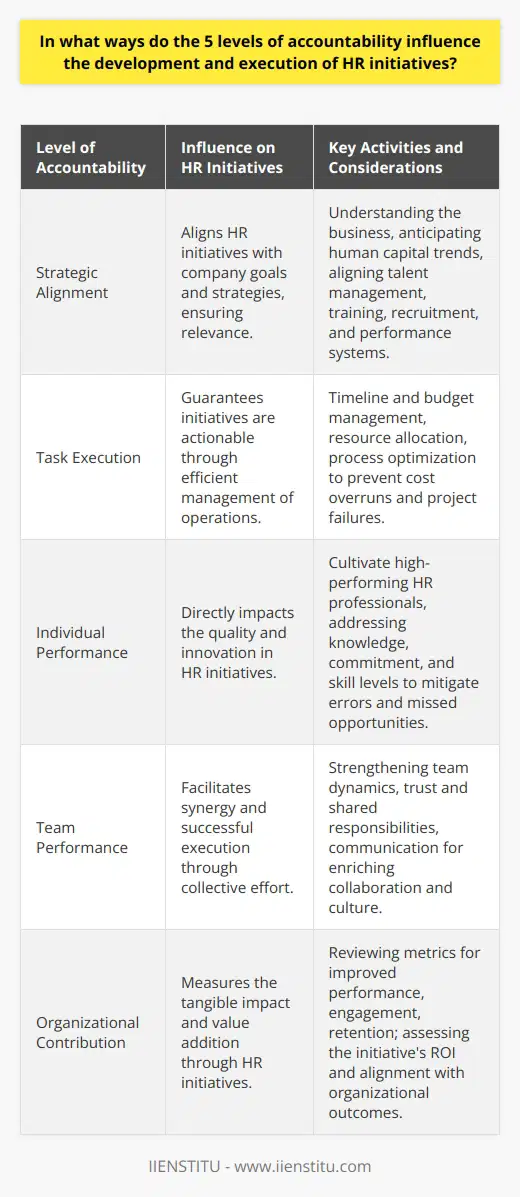
What is the significance of accountability leadership in shaping organizational culture and performance?
Accountability Leadership and Organizational Culture
Accountability leadership plays a significant role in shaping organizational culture and performance. This style of leadership reinforces the notion that every individual is responsible for their actions, decisions, and results. They construct an atmosphere where all team members understand their obligations and feel cared for.
Importance of Accountability Leadership
Accountability leadership brings about a high-performance culture in organizations. It encourages transparency, fosters trust and promotes a sense of ownership among team members. It drives them to take initiative, employ creative problem-solving techniques, and work more productively.
Influence on Work Performance
Accountability leadership positively influences work performance. Leaders who model accountability set an example for their teams. They provide clear expectations, intentionally work towards goals, and employ constructive feedback. This visible performance boosts morale and encourages employees to strive for excellence.
Impact on Organizational Culture
Accountability leadership has a profound impact on organizational culture. It ensures that individuals are held responsible for their actions, instilling a strong value system. Leaders who practice accountability build a culture of responsibility, where everyone feels their input is valuable.
Promotes Growth and Innovation
Accountability leadership fosters growth and innovation within an organization. It empowers employees to make decisions, solve problems, and act on their own initiative. This indicates a shared understanding of targets, leading to creative solutions and advancements.
In conclusion, accountability leadership shapes organizational culture and performance significantly. It creates an environment of trust, responsibility, and ownership, encouraging higher work performance and promoting growth and innovation. Thus, leaders should prioritize accountability, as it boosts performance and shapes a positive organizational culture.
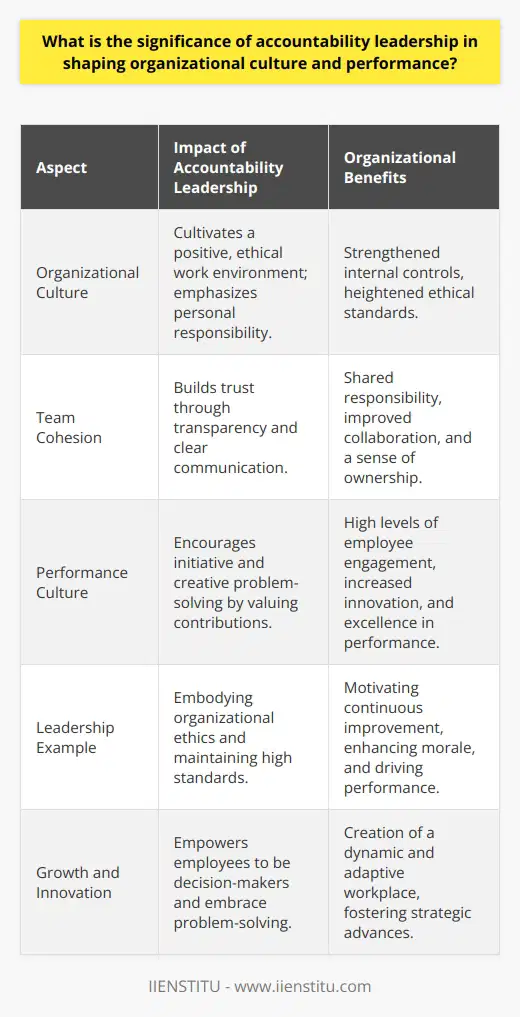
How can HR Management integrate the 4 A's of accountability into employee performance evaluations and feedback mechanisms?
Understanding the 4 A's of Accountability
To integrate the 4 A's of accountability - answerability, assumption, accuracy, and adjustment - into employee performance evaluations, HR management must first have a thorough understanding of these concepts.
Implementing Answerability
Answerability links responsibility to action. HR departments can incorporate this into performance evaluations by requiring employees to explain their decisions and actions. This encourages transparency and fosters a sense of responsibility.
Promoting Assumption
With regard to assumption, employers need to ensure that employees understand their roles. They should clearly define job responsibilities. This plays a crucial role in accurate self-assessment and status reporting.
Maintaining Accuracy
Accuracy in the context of accountability implies correctness and reliability of work. In performance evaluations, HR can measure this through the use of quality indicators. These could be error rates, tasks completed on time, or customer satisfaction.
Introducing Adjustment
Adjustment refers to making improvements based on feedback. HR should provide guidance on areas of improvement identified during the evaluation process. Employees must then take action to improve their performance.
Feedback Mechanisms
Feedback mechanisms are integral to performance evaluations. Regular feedback helps employees understand their strengths and weaknesses. HR needs to ensure that feedback is constructive and focuses on growth.
In conclusion, by integrating the 4 A's of accountability into employee performance evaluations and feedback mechanisms, HR management can promote a culture of accountability and continual improvement within the organization.
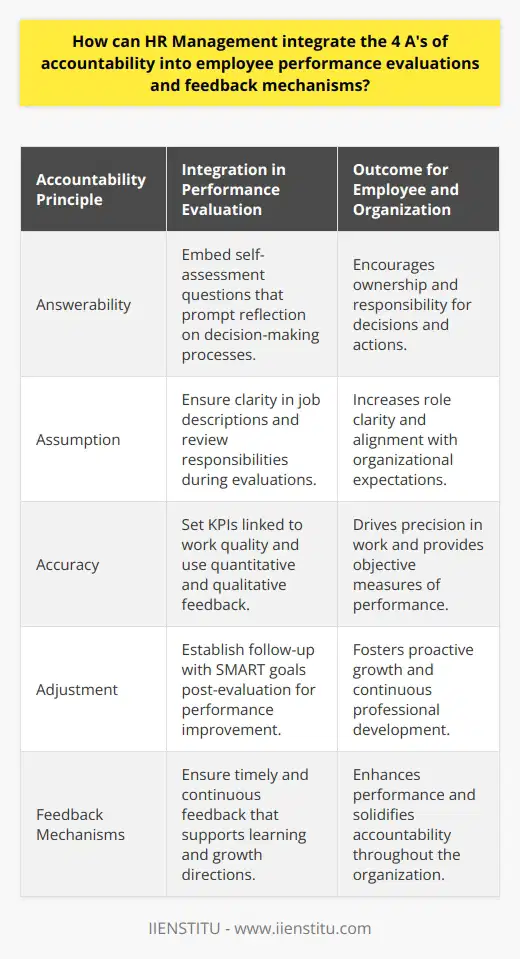
In what ways can HR support managers in developing and maintaining the 3 elements of accountability within their teams?
HR's Role in Accountability Support
Human Resources (HR) plays a critical role in supporting managers in cultivating the three key elements of accountability in their teams: understanding, ownership, and responsiveness.
Understanding Enhancement
HR can support managers in promoting understanding via comprehensive communication strategies. Training materials, written guidelines, and team meetings can help clarify objectives, expectations, and responsibilities to team members. HR can also help managers create a plan for sharing feedback and discussing job performance.
Ownership Encouragement
To encourage ownership, HR can assist managers in setting clear performance standards. Regular performance reviews can motivate team members to take responsibility for their work. HR can also help managers to implement a reward system that acknowledges the individual's contributions towards the team's goals.
Responsiveness Fostering
Responsiveness can be fostered through conflict resolution trainings facilitated by HR. Such trainings help managers address issues promptly to maintain team harmony. In addition, HR can guide managers in setting up effective feedback loops to ensure concerns are met with an appropriate response.
Furthermore, technological tools such as HR management systems can be employed to streamline processes and enhance responsiveness. Tracking key performance indicators, providing real-time feedback, and allowing for swift adjustments are just a few ways these technological supports can amplify responsiveness.
In conclusion, HR can bolster managers' efforts in building accountable teams. By fostering understanding, encouraging ownership, and enhancing responsiveness, HR serves as an invaluable partner in creating a culture of accountability within organizations.
